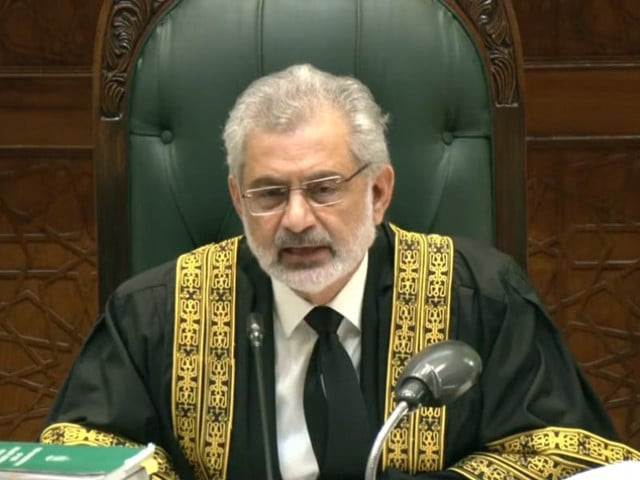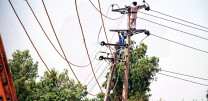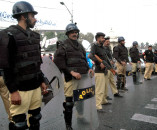Don’t use honorifics with Naqvi’s name: SJC
Council says he damaged judiciary’s reputation

The Supreme Judicial Council (SJC) has held that the honorifics “Justice” or “judge” should not be used with Sayyed Mazahar Ali Akbar Naqvi's name as he had damaged the reputation of the judiciary.
"We conclude that Justice Naqvi is guilty of misconduct and should have been removed from the office of a judge. The number of instances of misconduct committed by Justice Naqvi has damaged the reputation of the judiciary. When the SJC commenced [the] hearing of the complaints, and throughout, we referred to Sayyed Mazahar Ali Akbar Naqvi as Justice Naqvi, however, as he should have been removed for having committed serious [acts of] misconduct, the honorific ‘Justice’ or ‘Judge’ should not henceforth be used with Sayyed Mazahar Ali Akbar Naqvi's name," read a 33-page opinion authored by the SJC chairman, Chief Justice of Pakistan Qazi Faez Isa.
Out of 10, five charges of misconduct have been proven to be accurate before the council.
“Justice Naqvi cannot be said to be untouched by greed, and so [he] violated Article-II of the Code of Conduct. It also cannot be stated that he was above reproach, and so … violated Article-III of the Code of Conduct,” the opinion continued.
The SJC stated that Naqvi's conduct was also not free from impropriety expected of a judge in their official and private affairs.
[This was to] such an extent [that] he also violated Article-III of the Code of Conduct.”
The council pointed out that it was clear that Naqvi's actions were swayed by “consideration of personal advantage” and so he had violated Article-IV of the Code of Conduct.
The SJC held that Naqvi violated Article-VI of the Code of Conduct as he was involved to his personal advantage in a suit filed by Chaudhry Muhammad Shahbaz and knowingly deprived minors of their valuable property.
“By receiving substantial unexplained gifts, Justice Naqvi violated Article-VI of the Code of Conduct. The gifts included receiving Rs50 million; his sons receiving two commercial plots and two residential plots at a nominal price; and his daughter receiving £5,000.”
Therefore, the SJC concluded that that Naqvi was guilty of misconduct and should have been removed from the office of a judge.
Naqvi acquired a property at Saint John’s Park in Lahore Cantonment measuring 1,983.77 square yards from Chaudhry Muhammad Shahbaz and his son Muhammad Hassan Shahbaz on June 25, 2022 through a registered deed showing the sale consideration to be Rs106.84 million, but its market price was around Rs500 million.
The SJC observed that it had been established that Naqvi did not have sufficient income tax paid or declared money to justify the purchase of the property. It further noted that Naqvi had thrice revised his income tax or wealth statement to justify that he had the money to buy the property.
The owner of the property was Dr Bisma Warsi, who died in the year 2020 leaving behind her husband Chaudhry Muhammad Shahbaz and three minor sons namely Muhammad Hassan Shahbaz, Hussain Shahbaz Warsi and Ali Hamza Shahbaz Warsi.
Muhammad Hassan Shahbaz was born on June 3, 2004, Hussain Shahbaz Warsi on March 25, 2007, and Ali Hamza Shahbaz Warsi on August 19, 2008.
However, the property was sold by Chaudhry Muhammad Shahbaz and Muhammad Hassan Shahbaz by depriving two legal heirs of their share, namely Hussain Shahbaz Warsi and Ali Hamza Shahbaz Warsi.
Naqvi being a judge of the Lahore High Court had heard a writ petition in connection with the property and passed an order on December 17, 2012.
The SJC found that Naqvi misused his office and facilitated filing of a suit for declaration by and through Chaudhry Muhammad Shahbaz, wherein only one son of the late Dr Bisma Warsi was arrayed as the plaintiff namely Muhammad Hassan Shahbaz Warsi, who was a minor, and without disclosing the other two legal heirs.
The suit was filed against the public at large seeking a declaration that the plaintiffs were the only legal heirs of Dr Bisma Warsi.
The suit, filed on February 12, 2021, was decreed on March 31, 2021 with “extraordinary speed”.
On the basis of the decree passed in that suit, Naqvi exercised his influence with the Military Estate Office and Lahore Cantonment to have the property transferred into the names of the plaintiffs on June 24, 2022.
On the very next day on June 25, 2022, the property was purchased by Naqvi. A non-judicial stamp paper was used by Naqvi as a sale deed through which he bought the property on June 23, 2022, when it was not in the name of its sellers.
The facts taken together confirmed that extraordinary influence was exercised over the court and government officers by Naqvi by misusing his office and he had deprived two legal heirs of their fair share in the process.
"Justice Naqvi, in his reply to the show-cause notice, stated that 'As per the laws in Punjab, [the] suit for declaration of [the] legal heirs of [a] deceased owner is filed against the public at large’. In asserting this preposterously wrong concept to be the law of the Punjab (and to do so without citing the purported law) would be disingenuous of a law student but when a judge of the Supreme Court states this, the only conclusion which can be drawn is that Justice Naqvi was complicit in depriving the said minors of their property."
The SJC noted that Naqvi had bought Plot No 144, Block E-1, situated in Gulberg-3, Lahore, measuring 2 kanals and 4 marlas, for a declared price of Rs60 million. However, as he did not have this amount of income tax paid or declared money, therefore, he showed that he had sold Plot No 375, Phase-2, DHA, Gujranwala Cantonment, for Rs60 million, even though he had purchased it for Rs4.7 million.
The SJC observed that a commercial plot, measuring 100 square yards, and a residential plot, measuring 500 square yards, were given to Naqvi's son, Syed Tasadduq Murtaza Naqvi, in Lahore Smart City and Capital Smart City, respectively as well as another commercial plot, measuring 100 square yards and a residential plot, measuring 500 square yards, were given to his other son, Syed Tasadduq Mustafa Naqvi, at heavily discounted prices by the owner of the projects, namely, Zahid Rafique. The SJC noted that the reason for this was that Naqvi had facilitated Zahid Rafique’s business affairs by misusing his office and granting undue favours to him.
The council further stated that three plots of one kanal each -- Plot No 222, Block-B, Park Road, Federal Government Employees Housing Foundation, Islamabad; Plot No 357, Street No. 9, Block-A, Park Road, Federal Government Employees Housing Foundation, Islamabad; and Plot No 249, Street No. 1, G-17/1, Supreme Court Employees Cooperative Housing Society, Islamabad -- were illegally purchased by Naqvi without having sufficient income tax paid or declared money.
The SJC observed that Muhammad Safdar Khan and Zahid Rafique had tried their best to help Naqvi in justifying the price of the 100 Saint John's Park property and the payment of Rs50 million made by Lahore Smart City (Pvt) Ltd to acquire it.
“But they utterly failed to state, let alone justify, why a registered company would settle its liability of a substantial amount (fifty million rupees) which it allegedly owed to Muhammad Safdar Khan by not simply paying him the amount,” the SJC opinion stated.
“And, for a long standing businessman, which Zahid Rafique claimed he was, and for a well-established company, this is not only inexplicable but it is also contrary to rudimentary account keeping and would not be legally compliant,” it added.
“We, therefore, place no credence on the testimonies of Muhammad Safdar Khan and Zahid Rafique. On his part, Justice Naqvi offered no justifiable reason in his written reply for doing so and shied away from testifying. In his reply, Justice Naqvi did not disclose why a company had paid a substantial amount --fifty million rupees -- to buy 100 Saint John's Park. We are therefore left to conclude that Zahid Rafique through his company, Lahore Smart City (Pvt) Ltd, had paid a considerable portion of the sale consideration of 100 Saint John's Park.”
The council noted that a judge accepting such “largesse” from a property developer, who claimed that he hardly knew Naqvi, raised very serious questions of propriety.
“Since no viable explanation for paying the said fifty million rupees was forthcoming we are left to assume that such incomprehensible generosity to a judge was with the expectation that it would be handsomely recompensed.”
While concluding its opinion, the SJC also commended the Attorney General for Pakistan (AGP) Mansoor Usman, bar councils and Advocate Mian Dawood, the primary complainant against Naqvi, for their assistance in the matter for upholding the rule of law and the principles of accountability.



















COMMENTS
Comments are moderated and generally will be posted if they are on-topic and not abusive.
For more information, please see our Comments FAQ